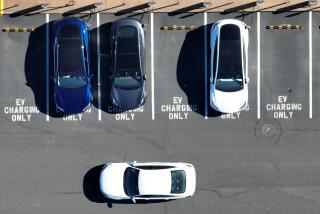Congress Passes Landmark Transportation Bill
- Share via
WASHINGTON — Despite strident complaints about money and fairness, Congress on Wednesday overwhelmingly approved a landmark, $151-billion transportation bill that for the first time gives states a major say in how they spend billions of federal dollars for highways and mass transit.
The House voted, 372 to 47, to approve the complex, six-year public works package after hours of intense maneuvering and often acrimonious debate that ended at 6 a.m. The Senate followed suit nine hours later with a vote of 79 to 8.
The bill provides $119.5 billion for highways and $31.5 billion for mass transit over the next six years, a 40% increase in highway spending and a near doubling of transit expenditures.
It also permits states and local governments to spend nearly three quarters of the money that is set aside for highways on bus and rail projects instead if they so choose.
The transportation legislation, which marks the end of the 35-year era of construction of the interstate highway system, was authored largely by Sen. Daniel Patrick Moynihan (D-N. Y.) and Rep. Robert A. Roe (D-N. J.). The legislators led a 92-member, House-Senate conference committee that completed work on the compromise Tuesday afternoon.
The measure was heralded by congressional leaders, environmentalists and California transportation officials as a substantial improvement over existing law.
“Reaching this moment is an enormous achievement,” said Sen. Alan Cranston (D-Calif.), who worked on the mass transit portion of the bill. “What we have (done) for rapid transit as an alternative for more and more congestion, more and more pollution . . . is a tremendous accomplishment.” Both Cranston and Sen. John Seymour (R-Calif.) voted for the package.
William J. Roberts, legislative director of the Environmental Defense Fund, called the legislation a victory for those who believe the solution for the nation’s transportation problems is not building more highways.
“Congress finally broke the highway interests’ stranglehold on transportation funding,” Roberts said. “In the past, the vast bulk of transportation funds had to be spent on roads. . . . That is no longer the case.”
California will receive at least $10.5 billion in highway funds over the next six years, much of which can be spent on mass transit projects. The bill also specifically earmarks $1.3 billion for extension of the Bay Area Rapid Transit system in Northern California and the Metro Rail system in Los Angeles.
The lopsided margin of support for the package belied the depth of resentment of some senators and representatives who believed that their states were being shortchanged in the parceling out of aid money.
“There are a series of serious, egregious problems with this legislation,” added Sen. Bob Graham (D-Fla.), who said that Florida and other states that have grown rapidly in recent years should be entitled to more federal aid.
More to Read
Get the L.A. Times Politics newsletter
Deeply reported insights into legislation, politics and policy from Sacramento, Washington and beyond. In your inbox twice per week.
You may occasionally receive promotional content from the Los Angeles Times.









